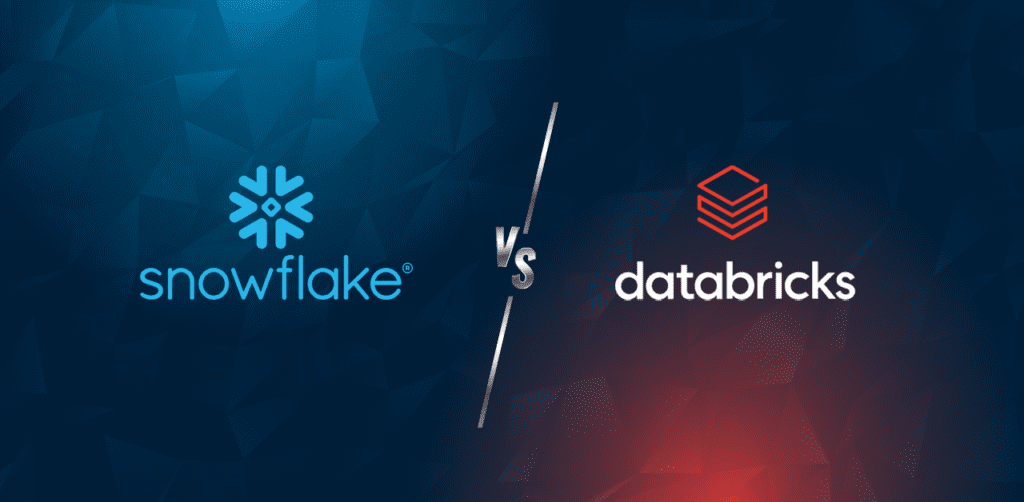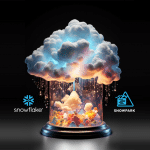Why this blog?
In today’s data-driven world, effectively managing and harnessing data is more crucial than ever. This blog provides valuable insights into choosing the right cloud data engineering and analytics platform between Databricks and Snowflake. Learn how these leading platforms offer scalable, secure, and flexible solutions for your data management needs, and discover real-world use cases that showcase their strengths. Whether you’re dealing with structured or semi-structured data, this guide will help you make an informed decision to optimize your data operations.
The tide of data continues to challenge businesses in its storage, processing, and analysis. As of 2023, the amount of data produced globally each day is estimated to be in the ballpark of 64 zettabytes (Statista), highlighting the crucial role of effective data management solutions. Cloud data platforms like Databricks and Snowflake have emerged as leaders, offering businesses scalable, secure, and flexible tools to harness the power of their data.
Organizations leverage information to make informed decisions, personalize products and services, and optimize operations. But with vast amounts of data at their fingertips, the real challenge lies in effectively storing, processing, and analyzing it. This is where cloud data platforms come in, providing businesses with the capabilities they need to manage their data efficiently.
By 2024, the global daily data creation is projected to have grown significantly from the 64 zettabytes recorded in 2023. This surge underscores the indispensable role of robust data management solutions. Databricks and Snowflake, as frontrunners in the cloud data platform arena, offer scalable, secure, and flexible tools that are essential for businesses to harness their data’s full potential.
Databricks: The All-Star Data Champ
Databricks offers a comprehensive suite of tools for data engineering and data science needs. Think of them as a one-stop shop for:
- ETL (Extract, Transform, Load): Move data seamlessly between disparate sources.
- Batch Processing: Efficiently handle large-scale data processing tasks.
- Stream Processing: Analyze real-time data streams for immediate insights.
- Machine Learning: Build, train, and deploy machine learning models at scale.
Databricks goes beyond core functionality with features like:
- Collaboration tools: Foster teamwork among data scientists, analysts, and engineers.
- Multi-cloud support: Deploy on your preferred cloud provider (AWS, Azure, or GCP).
Snowflake: The Secure Data Fortress
Snowflake provides a secure and high-performance cloud-based data warehouse solution. Here’s what makes them stand out:
- Data Warehousing as a Service (DaaS): Leverage a scalable and secure data warehouse without managing infrastructure.
- ELT Capabilities: Efficiently load, transform, and load data for analysis.
- Support for Semi-Structured Data: Handle a wider variety of data formats beyond traditional structured data.
Snowflake prioritizes security and offers features like:
- Top security features: Ensure your data remains protected with robust security measures.
- Availability on major cloud providers: Deploy on AWS, Azure, or GCP for flexibility.
Real-World Use Cases
Databricks and Snowflake empower businesses across industries. Here are a couple of examples:
- Customer Data Platform on Snowflake: A CDP provider used Snowflake’s platform to manage various workloads cost-effectively. The data warehousing solution’s ability to store data closer to customers improved performance and regulatory compliance. Additionally, Snowflake’s support helped them accelerate customer onboarding and expand globally.
- Personalization with Databricks: A ride-hailing platform adopted Databricks’ Lakehouse Platform to create a unified customer data solution. This improved user experience by providing a centralized view of customer data, leading to more effective marketing campaigns and a more personalized in-app experience. Databricks’ platform also helped them reduce engineering overhead.
Choosing the Right Platform
Data management necessitates reliable ways to measure platform performance. Industry benchmarks like TPC-DS (Transaction Processing Performance Council Decision Support Benchmark) provide a starting point for evaluating data warehousing systems. However, it’s important to acknowledge that benchmarks like TPC-DS are constantly being updated (like the recent release of TPC-DS v4) to reflect modern data warehouse workloads.
While benchmarks offer valuable insights, the best platform for your business hinges on your specific needs. Consider factors like:
- Data types you work with: Structured, semi-structured, or unstructured data.
- Budget and scalability requirements.
- Existing tech stack and cloud environment.
- Security and compliance needs.
Databricks and Snowflake are constantly innovating to address the challenges of big data management. Databricks is focusing on real-time analytics, serverless capabilities, and advancements in machine learning. Snowflake is prioritizing data application development, data sharing through features like Snowpark and Private Data Exchanges, and ensuring robust security and compliance features. Choosing the right cloud data platform is crucial for businesses navigating the ever-increasing data landscape. Databricks and Snowflake, with their distinct strengths and ongoing advancements, are both powerful contenders. By carefully evaluating your data management needs and considering the latest capabilities of each platform, you can make an informed decision that empowers your organization to unlock the true potential of its data.
A comparative guide :
If you need more detailed information regarding each of the platforms, visit the official Databricks and Snowflake websites.
FAQ’s
What is the best cloud data platform for real-time analytics?
Databricks excels in real-time analytics with its powerful stream processing capabilities, enabling immediate insights from live data streams.
What makes Snowflake a secure cloud-based data warehouse solution?
Snowflake offers a secure cloud-based data warehouse, leveraging robust security measures and compliance features to ensure data protection across AWS, Azure, and GCP.
Which cloud data platform is best for big data management?
Databricks and Snowflake both excel, with Databricks offering comprehensive data engineering and machine learning, and Snowflake providing scalable and secure data warehousing.
What cloud data platform is recommended for data science needs?
Databricks is ideal for data science, offering extensive tools for machine learning model development, training, and deployment, along with strong collaboration features.
Which cloud platform provides data warehousing as a service?
Snowflake is known for its Data Warehousing as a Service (DaaS), providing a scalable and high-performance data warehouse solution without the need for infrastructure management.
Which cloud data platform has strong ETL capabilities?
Databricks offers robust ETL capabilities, enabling seamless data movement and efficient processing for both batch and real-time data.










